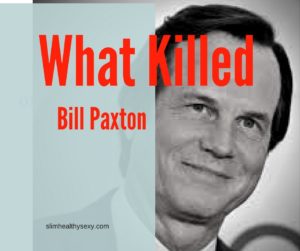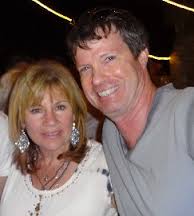What Killed Bill Paxton?

What killed Bill Paxton by Terry Ryan
Bill Paxton, 61, actor, father, and husband, passed away Saturday, February 25, 2017 due to complications from surgery. He underwent heart surgery and suffered a stroke afterwards. (Source: TMZ)
Potential Complications During and After Heart Surgery
Some of the more common complications of heart surgery are routinely dealt with during the hours and days of recovery in the hospital. The patient is closely monitored for these complications by staff.
- Bleeding: May occur at the incision site or from the area of the heart where surgery is performed
- Abnormal heart rhythm: In rare cases a temporary external, or permanent internal pacemaker may be necessary to correct this problem.
- Ischemic heart damage: Damage to heart tissue caused by a lack of blood flow to the heart

- Death: The risk of death is increased in surgeries where the heart is stopped for the procedure.
- Blood clots: Clots may form in and around the heart or travel through the bloodstream.
- Stroke: Often caused by clots that form in the blood after surgery
- Blood Loss: In some cases, a transfusion may be necessary.
- Emergency surgery: If a problem is discovered after surgery, an emergency surgery may be necessary to repair any problems.
- Cardiac tamponade (pericardial tamponade): A life-threatening condition where the pericardium, the sac surrounding the heart, fills with blood. This makes it difficult, or impossible, for the heart to fully function. (Source: https://www.verywell.com/heart-surgery-complications-and-risks-3156953)
Other side-effects include heart attack, respiratory complications, bleeding complications, infections, high blood pressure and stroke. When the vessels around the heart are clamped shut during the operation, plaque breaks off of the inner walls. Blood then carries this debris to the brain, where it causes numerous “mini” strokes.
About 70-80% of patients undergo bypass surgery remain free of chest pain (angina) for one year. But this doesn’t last forever. Within three years of the operation, up to one-third of patients will suffer from chest pain again.
Long-term studies indicate that only certain subsets of heart disease patients live longer because of their bypass operation.
What to do? A vegetarian diet could prevent and even reverse heart disease.
If all the parts of your circulatory system—the veins, arteries and capillaries—were placed end to end, they would stretch for more than 60,000 miles. That’s more than two times around the earth! But one tiny blockage could bring all 60,000 miles to a halt. Doctors use many medicines and surgical procedures to keep the system running.
But back in 1990, a major shift began in medical practice. That was the year that a young doctor in California published a study that set out to test whether heart disease could not simply be prevented, but might actually be reversed. And he wanted to see if it could be done, not with surgery or drugs, but with diet and lifestyle changes alone.1 This notion was inconceivable to some. After all, heart disease was a one-way street unless it was treated with cholesterol-lowering drugs, heart pills, and when needed, open-heart surgery.
Dr. Dean Ornish, a Harvard-trained physician, studied 47 patients in the San Francisco Bay Area, all of whom had significant heart disease. That is, the coronary arteries that brought blood and oxygen to their hearts were starting to narrow, pinching off blood flow and threatening the viability of the heart. Some had already had heart attacks. He assigned half of the patients to a control group that received the standard care that doctors usually prescribe, meaning a diet centered on “lean” meat, poultry, and fish, along with various medications and the usual advice not to smoke.
The remaining patients were assigned to a very different program. They were asked to follow four steps:
- A low-fat, vegetarian diet
- Brisk walking for a half-hour per day or an hour three times per week
- No smoking
- Stress management exercises
He used a vegetarian diet, because cholesterol and saturated fat are found mainly in animal products. So the prescribed diet excluded red meat, poultry, and fish, virtually eliminating cholesterol and animal fat. It reduced all sources of fat, including vegetable oils. But Dr. Ornish used no drugs at all—not even cholesterol-lowering drugs. The program consisted only of simple diet and lifestyle changes.
One year later, all patients had an angiogram—a special x-ray that reveals the blockages in the coronary arteries, and the results were compared to the same sort of test done at the beginning of the study. The results made medical history. The control-group patients, who had been following the more traditional medical routine, had not generally improved. In fact, the blockages in their coronary arteries were worse, on average, than at the beginning of the study. They still had chest pain and still needed medications. That was not news. Despite typical heart treatments, heart disease usually worsens as time goes on.
For the patients in the experimental group, however, the story was very different. Chest pain began to disappear within weeks. Their cholesterol levels dropped dramatically. And their coronary arteries, which had been gradually closing off, year after year, were actually starting to reopen. In fact, the effect was so great that angiograms showed clear evidence of reopening in 80% of patients in the first year.
These results were published in The Lancet in 1990 and gave doctors a new tool for reversing heart disease. The program cost much less than surgery, was surprisingly easy to follow, and could help keep patients healthy over the long run. The only “side effects” were good ones: the average patient lost 22 pounds in the first year!
A Cleveland Clinic surgeon, named Caldwell Esselstyn, used the same type of diet for severely ill heart patients.Some of the patients had been told they had less than a year to live. But of the 17 patients who stuck to the program, there was not a single cardiac event over the next 12 years! They were alive and well—and had reversed their disease. (source: https://www.pcrm.org/about/volunteer/preventing-and-reversing-heart-disease)
The Bill Clinton Diet
When President Bill Clinton suffered from debilitating chest pain, he was living on the typical American diet of meat and potatoes.
In the White House, Bill Clinton’s appetite was legend. He loved hamburgers, steaks, chicken enchiladas, barbecue and french fries but wasn’t too picky. At one campaign stop in New Hampshire, he reportedly bought a dozen doughnuts and was working his way through the box until an aide stopped him.
Former President Clinton now considers himself a vegan. He’s dropped more than 20 pounds, and he says he’s healthier than ever. His dramatic dietary transformation took almost two decades and came about only after a pair of heart procedures and some advice from a trusted doctor. (Source: http://www.cnn.com/2011/HEALTH/08/18/bill.clinton.diet.vegan/)
http://thehill.com/blogs/in-the-know/in-the-know/270806-bill-clinton-going-vegan-has-kept-me-alive
CNN: Dr. Ornish Discusses Bill Clinton’s Dramatic Weight Loss with Wolf Blitzer
Instead of people waiting for heart disease to stop them in their tracks, start adopting a vegetarian diet. Not only will your heart “thank you,” but so will your eyes, your skin, your everything. Your life.
Conventional medicine is great! You have a broken leg, infected toe, sore throat, etc. they are there for you and can help you heal. But they can’t do all the work. It is up to you to take the mature steps to a healthy and long life. That means taking care of yourself, unless you want to someday lay on a table in an operating room counting down from 100 for the anesthesia to kick in. As we all know from what happened to Bill Paxton, that outcome is not always in your favor.
Things to stop right now for a better life:
- Give up smoking (Are you kidding? You are still smoking?)
- Alcohol…nope
- White sugar – the devils poison. Stop eating sugar
- Eating things like prime rib. Come on! Self-explanatory
- Not taking time to smell the roses. Stress is a killer!
- Illegal drugs (Bad idea)
I’d like to add that Bill Paxton was one of my favorite actors, and I am so sorry for his family’s loss. What a tragedy and was it possibly preventable with a vegetarian diet. That question will never be answered. He could have had a family history of heart disease and genetics played a big part in this equation.
My suggestion is put the odds in your favor. People depend on you and you deserve a healthy and happy life. Eat more vegetables!
Thanks for reading!
 Terry Ryan, Health Blogger
Terry Ryan, Health Blogger



 D5 Creation
D5 Creation